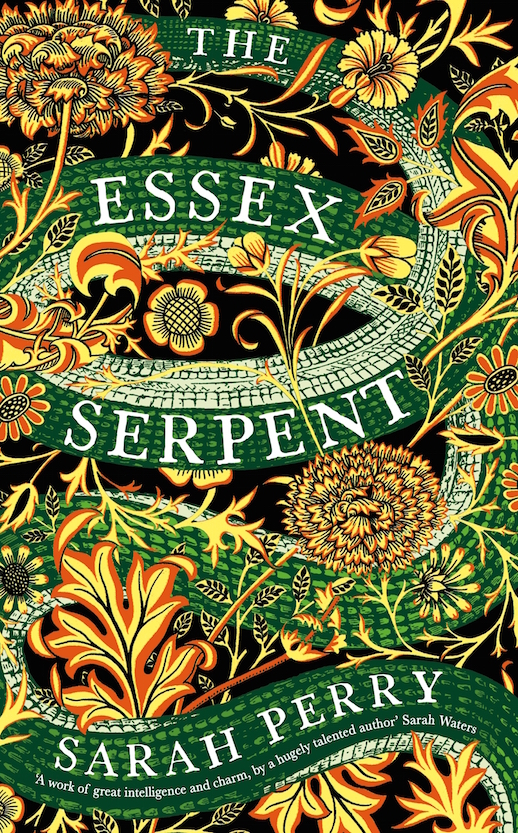
The Essex Serpent by Sarah Perry
(Serpent’s Tail, 432 pages, hardback. Out now and available here in the Caught by the River shop.)
Review by Nina Lyon
Recently escaped from an abusive marriage and the oppressions of London society, Cora Seaborne arrives, unsettled, in late Victorian Colchester with the intention of sinking herself into the acquisition and study of fossils. She is soon drawn, companion and eccentric son in tow, to the remote coastal village of Aldwinter, where she strikes up a friendship with its vicar, William Ransome, that threatens to displace existing bonds with her feisty companion Martha and her late husband’s brilliant surgeon, Luke Garrett. A wave of disturbances along the Essex coastline – drownings, storms, snatched livestock – are attributed first quietly and then, with Cora’s unwitting intervention, more stridently to the mythical Essex Serpent.
Told through the course of a year, Perry sets out an elemental time in mud and ice, blossom and berries and the waxing and waning of the tides, capturing a lostness of the Essex coast that still lingers behind boatyards and boxing gyms. But, far from being some bleak tale of misery and doom, the whole thing thrums with life, told with warmth and wit. Most suspenseful in a story one might at first imagine as a piece of Gothic horror are the various serpentine turns of the relationships, driven in equal measure by intellect and lust, between Perry’s flawlessly sketched characters.
The political side-plot of Martha’s interventions in the London slums reveals the target of the Essex villagers’ moral panic to be mistaken: the real malign tentacles at work here are those of capital. It is a Dickensian account of systemic squalor and private suffering told through the tightly woven threads of the characters’ lives, but, unlike Dickens, there is no mawkishness, no transliterated imagined dialect of the feebleminded. Perry’s cripple is an inventive comic, her lost girl an artist of unanticipated resilience. Even at the edges, her characters brim with vitality. It is hard to read without mentally casting the inevitable BBC adaptation, which deserves a lengthy serialisation to do them all justice.
There is a clear political purpose to the whole affair, and it is sometimes unclear how far it is possible to go in refracting lessons serially unlearned of poverty and inequality through the lens of historical fiction. Perry’s characters are thoroughly modern Victorians, largely in possession of the sensibilities of the twenty-first century left.
But, as Perry mentions in her note at the end of the book, we are often in danger of ascribing an archaic piety to all Victorian life, which saw in the beginning of a world we continue to inhabit. Instead, she extracts the big intellectual shifts of that era: the scientific and medical revolutions, the battle between the new materialism and religious faith, the rumblings of dissent in industrial society. The peculiarities of Will’s purportedly Christian doublethink, levelled against the magical thinking he denounces among his congregation, are accurately of their time.
The Essex Serpent takes on a playful relationship with its history, a magical Victorianism, and is all the livelier for it. Like its protagonist, its learning is counterpointed with levity, emotional entanglements and an intent appreciation of the world outside, rich with messiness and contradiction as nature intended.
Nina Lyon will speak on the Waterfront Stage at Caught by the River Thames this August. More info/tickets.